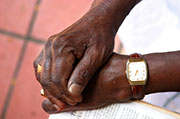
TUESDAY, Jan. 13, 2015 (HealthDay News) — Researchers who discovered new gene mutations linked to colon cancer in black Americans say their findings could lead to improved diagnosis and treatment.
In the United States, blacks are significantly more likely to develop colon cancer and to die from the disease than other racial groups.
For the study, the researchers said they used DNA sequencing to examined 50 million bits of data from 20,000 genes. They said that determining gene mutations has been the driving force behind all the new drugs created to treat cancer in the last decade.
“Many of the new cancer drugs on the market today were developed to target specific genes in which mutations were discovered to cause specific cancers,” study corresponding author Dr. Sanford Markowitz, an expert in the genetics of cancer at Case Western Reserve University in Cleveland, said in a university news release.
The investigators compared 103 colon cancer samples from black patients and 129 samples from white patients treated at University Hospitals Case Medical Center in Cleveland. They found 20 previously unknown gene mutations in the colon samples from black patients.
About 40 percent of colon cancers in black patients had one or more of these gene mutations, which were three times more common in colon cancers among blacks than among whites.
The findings were published in this week’s issue of the Proceedings of the National Academy of Sciences.
“This is the first study to perform a comprehensive gene mutation characterization and comparison of these colorectal cancer tumors in two ethnicities — African-American and Caucasian,” lead author Dr. Kishore Guda, an assistant professor in General Medical Sciences (Oncology) at Case Comprehensive Cancer Center, said in the news release.
“Our next step will be to collaborate with other centers in investigating African-American populations in different regions of the United States to determine whether they also share the unique gene signature found in the Cleveland African-American community,” Guda added.
Further research is needed to learn more about the behavior and effects of these mutations, including whether they’re linked with more aggressive colon cancer, the study authors said.
More information
The American Cancer Society has more about colon cancer.
Copyright © 2026 HealthDay. All rights reserved.

